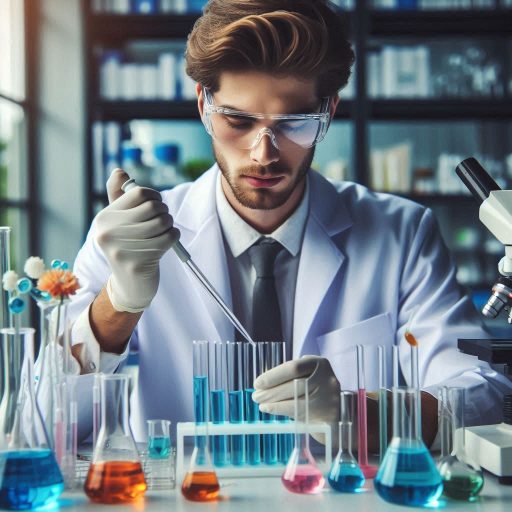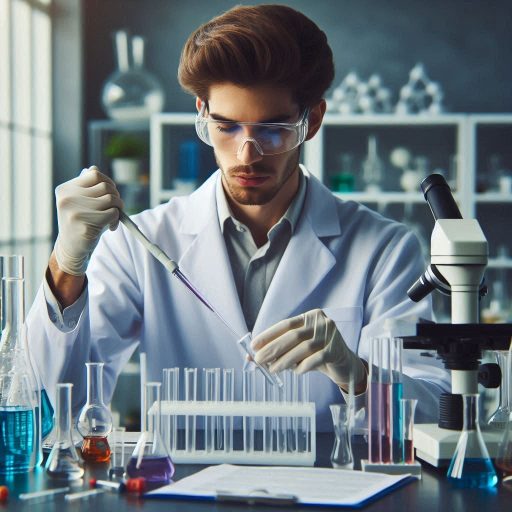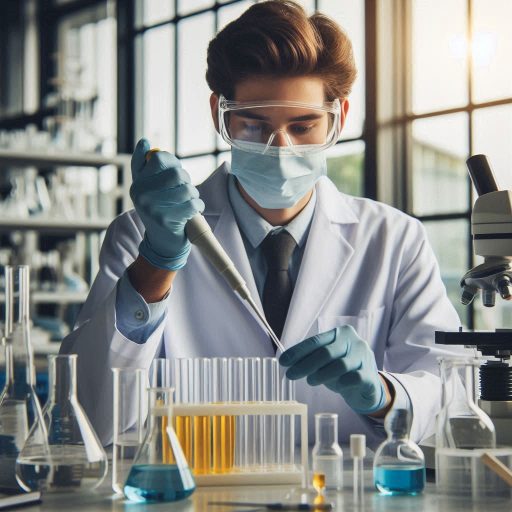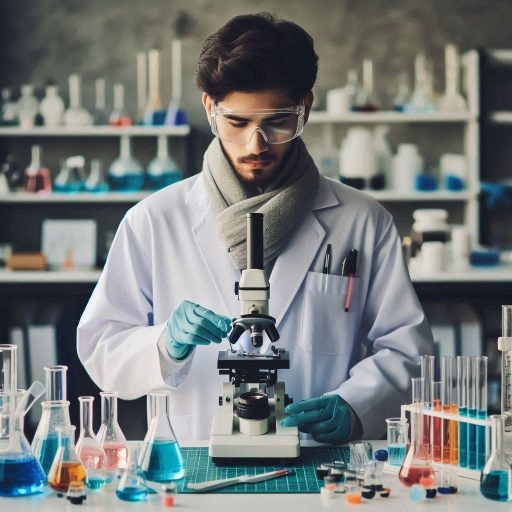Introduction
Lab technicians play a crucial role in diagnosing diseases.
They work behind the scenes to analyze samples and provide essential data for patient care.
In healthcare settings, lab technicians’ precision and expertise ensure accurate diagnosis and effective treatment plans.
This blog post explores their vital functions, including sample analysis, test performance, and result interpretation.
We will also discuss the challenges they face and the impact of their work on patient outcomes.
Brief Overview of Lab Technicians’ Role
Lab technicians are healthcare professionals specializing in analyzing biological samples.
They handle blood, urine, and tissue samples to detect abnormalities.
Their work helps in diagnosing conditions such as infections, cancers, and metabolic disorders.
By performing various tests, they provide valuable insights into a patient‘s health status.
Accurate results from lab technicians guide physicians in determining the most appropriate treatments.
Importance of Lab Technicians in Healthcare Settings
Lab technicians ensure the accuracy and reliability of diagnostic tests.
They play a key role in identifying diseases early, which is crucial for successful treatment.
Their expertise directly influences patient care decisions.
In many cases, timely and precise lab results can save lives.
Overview of the Blog Post Content
This blog post will delve into the specific responsibilities of lab technicians.
We will explore their roles in performing diagnostic tests and managing laboratory equipment.
Additionally, we will highlight the importance of their contributions to disease diagnosis.
Challenges faced by lab technicians, such as dealing with complex cases and maintaining accuracy, will be discussed.
We will also cover the impact of their work on patient outcomes and healthcare quality.
The educational background and training of lab technicians
Educational Requirements for Becoming a Lab Technician
To become a lab technician, individuals must typically earn an associate’s degree in clinical laboratory science or a related field.
Programs often include coursework in biology, chemistry, and microbiology.
Aspiring lab technicians also need to complete hands-on laboratory training to gain practical experience.
Some positions may require a bachelor’s degree, especially for those aiming for more advanced roles.
Additionally, certification from a recognized professional organization is often necessary.
This educational foundation ensures that lab technicians have the knowledge and skills to perform accurate and reliable diagnostic tests.
Training Programs for Lab Technicians
Lab technicians undergo rigorous training programs that cover a wide range of skills and techniques.
These programs usually include both classroom instruction and practical lab work.
Training focuses on operating and maintaining various diagnostic instruments and performing complex tests.
Technicians learn to handle samples properly, ensure accuracy, and troubleshoot issues.
Many programs offer specialized training in areas such as hematology, microbiology, or clinical chemistry.
Internships or clinical rotations are also common, providing real-world experience and exposure to different laboratory settings.
This comprehensive training equips lab technicians to handle diverse diagnostic tasks effectively.
Importance of Continuous Education and Professional Development
Continuous education and professional development are crucial for lab technicians.
The field of medical diagnostics is constantly evolving with new technologies and methodologies.
Lab technicians must stay updated on the latest advancements to maintain high standards of practice.
Continuing education helps technicians learn about new testing techniques, equipment, and industry best practices.
Professional development opportunities, such as workshops and conferences, also enhance their skills and knowledge.
Certification renewal and additional qualifications can further boost career prospects and ensure technicians provide the best possible care.
Ongoing learning is essential for adapting to changes and improving diagnostic accuracy.
In summary, lab technicians play a vital role in disease diagnosis through their educational background, training, and commitment to continuous learning.
Their rigorous training prepares them for the complexities of diagnostic testing, while ongoing education ensures they stay current in a rapidly advancing field.
This dedication to professional growth helps maintain the high quality of diagnostic services and supports effective disease management.
Read: CAD Technician Salary: What to Expect in the USA
The role of lab technicians in sample collection and handling
Sample collection in healthcare settings involves a meticulous process to ensure accurate testing and diagnosis.
Lab technicians play a crucial role in this process, as they are responsible for collecting, handling, and processing specimens effectively.
Process of sample collection in healthcare settings
- Lab technicians follow strict protocols for collecting different types of samples, including blood, urine, tissue, and swabs.
- They must ensure that the patient’s identity is confirmed before collecting any samples to prevent mix-ups or errors.
- Proper hygiene practices are essential during sample collection to prevent contamination and ensure accurate results.
- Lab technicians use specific techniques and equipment to collect samples safely and efficiently, following standardized procedures.
Importance of proper handling and labeling of samples
- Proper handling of samples is crucial to maintain their integrity and prevent degradation before testing.
- Lab technicians must ensure that samples are stored at the correct temperature and environment to preserve their quality.
- Labeling samples accurately with the patient’s information and other relevant details is vital for tracking and identification.
- Incorrect labeling or mishandling of samples can lead to errors in testing and potentially affect patient care and treatment.
How lab technicians ensure the accuracy and reliability of test results through sample handling
- Lab technicians follow strict quality control measures to ensure the accuracy and precision of test results.
- They adhere to standardized protocols and guidelines for sample handling to minimize errors and variability in testing.
- Regular calibration and maintenance of equipment used for sample handling are essential to ensure reliable results.
- Lab technicians undergo training to stay updated on the latest techniques and best practices for sample handling and processing.
In review, the role of lab technicians in sample collection and handling is vital for accurate disease diagnosis and patient care.
Their attention to detail, adherence to protocols, and commitment to quality ensure the reliability of test results and contribute to improved healthcare outcomes.
Read: Top CAD Software for Aspiring CAD Technicians
Performing Laboratory Tests and Procedures
Laboratory technicians play a crucial role in the healthcare system.
They are responsible for performing various tests and procedures that are vital for disease diagnosis.
These professionals handle a wide array of tests, ranging from blood and urine analysis to complex genetic testing.
Each type of test serves a unique purpose and provides critical information that aids in diagnosing and monitoring diseases.
For instance, blood tests can reveal a patient’s glucose levels, kidney function, or potential infections.
Urinalysis can detect urinary tract infections, kidney disorders, and even early signs of diabetes.
Genetic testing helps in identifying inherited conditions and assessing the risk of certain diseases.
These tests, performed by lab technicians, are the backbone of medical diagnostics.
Steps Involved in Conducting Laboratory Tests
The process of conducting laboratory tests involves several critical steps.
First, the lab technician receives the specimen, which could be blood, urine, tissue, or other bodily fluids.
They carefully label the specimen to ensure it corresponds to the correct patient.
Next, the technician prepares the specimen for analysis, which may involve centrifugation, staining, or chemical treatment, depending on the test.
Following this, the technician operates sophisticated laboratory equipment to conduct the test.
This equipment includes microscopes, automated analyzers, and PCR machines, each requiring a high level of skill and precision.
After running the test, the technician records the results and ensures the accuracy of the data.
Each step in this process is crucial and requires meticulous attention to detail to prevent errors that could lead to misdiagnosis.
The Role of Lab Technicians in Analyzing and Interpreting Test Results
Once the laboratory tests are complete, the role of the lab technician extends to analyzing and interpreting the results.
They must thoroughly review the data to ensure it is accurate and reliable.
In some cases, this involves comparing the results to reference ranges and identifying any abnormalities.
Lab technicians work closely with pathologists and other healthcare professionals to discuss findings and provide insights into the test results.
Their analysis helps to confirm diagnoses, monitor disease progression, and evaluate the effectiveness of treatments.
The lab technician‘s interpretation of test results is essential for guiding the clinical decisions made by doctors.
Their expertise ensures that patients receive the correct diagnosis and appropriate care.
Lab technicians, therefore, play an indispensable role in the diagnosis and treatment of diseases.
Their work behind the scenes is fundamental to the successful functioning of healthcare systems.
Read: How to Become a CAD Technician: Step-by-Step Guide
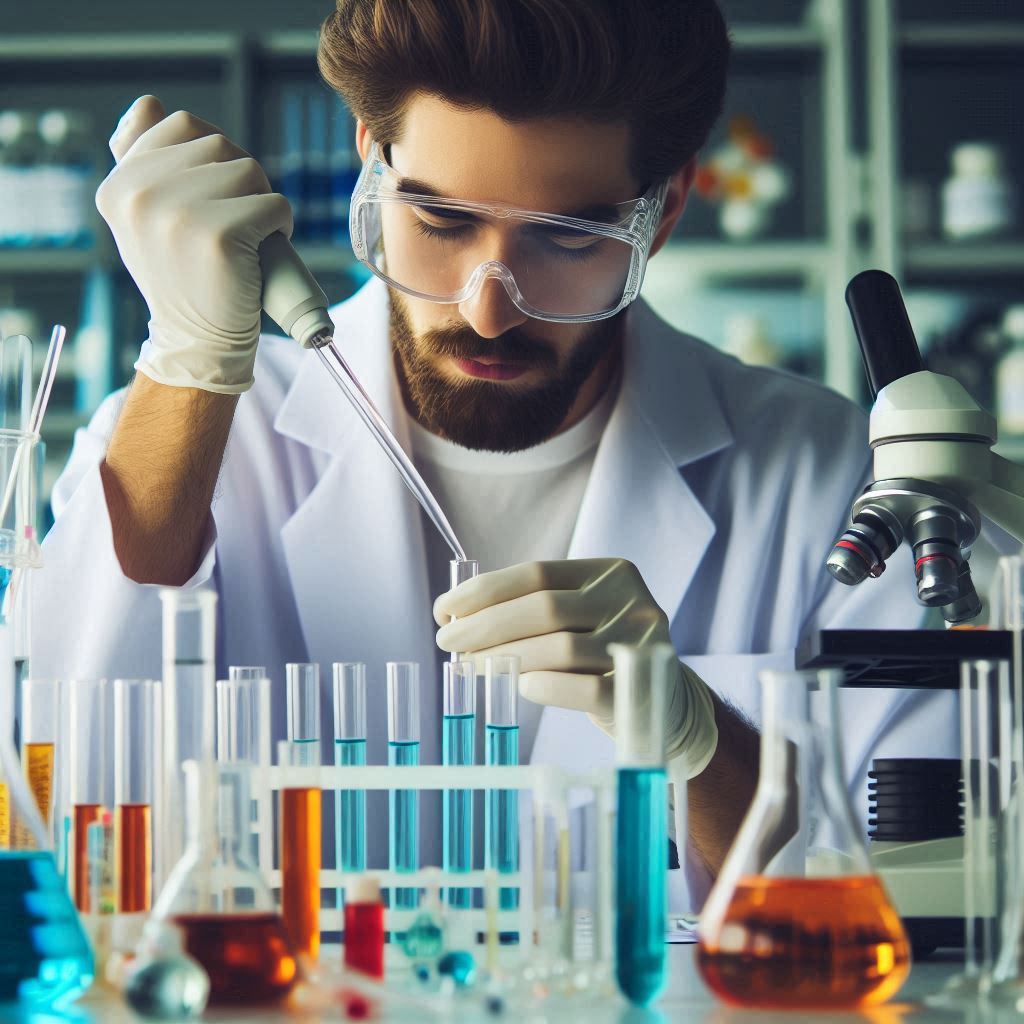
Ensuring quality control and assurance in the laboratory
Quality control measures in the laboratory are vital for accurate disease diagnosis.
Lab technicians play a crucial role in ensuring that these measures are implemented effectively to maintain the quality of results.
Importance of quality control measures in the laboratory
- Quality control measures help in detecting errors and ensuring the accuracy of test results.
- These measures are essential for maintaining the reliability and credibility of the laboratory.
- They help in identifying and rectifying any issues that could compromise the accuracy of test results.
- Quality control measures contribute to the overall quality assurance program of the laboratory.
How lab technicians monitor and maintain the quality of laboratory equipment
- Lab technicians conduct regular maintenance checks on laboratory equipment to ensure they are functioning properly.
- They calibrate and validate equipment to guarantee the accuracy and precision of test results.
- Lab technicians follow manufacturer’s guidelines for the proper use and maintenance of equipment.
- They troubleshoot equipment issues and ensure timely repairs to prevent any disruptions in testing procedures.
Role of lab technicians in adhering to safety protocols and guidelines
- Lab technicians are responsible for following safety protocols to prevent accidents and ensure the well-being of lab personnel.
- They wear appropriate personal protective equipment (PPE) while handling hazardous materials or performing risky procedures.
- Lab technicians follow standard operating procedures (SOPs) to maintain a safe working environment in the laboratory.
- They participate in safety training programs to stay updated on the latest safety procedures and guidelines.
In review, lab technicians play a critical role in ensuring quality control and assurance in the laboratory.
By monitoring and maintaining the quality of laboratory equipment, as well as adhering to safety protocols and guidelines,
they contribute to the accuracy and reliability of disease diagnosis.
Read: Surveying and Mapping Technician Internships: A Guide
Collaboration with other healthcare professionals
How Lab Technicians Work Closely with Doctors, Nurses, and Other Healthcare Professionals
Lab technicians play a crucial role in the healthcare system by collaborating with doctors, nurses, and other medical staff.
They are responsible for conducting various tests that help in diagnosing diseases.
Lab technicians collect samples, perform tests, and analyze results with precision.
They work closely with doctors to understand the specific needs of each patient.
This interaction ensures that the tests are accurate and relevant.
Nurses often provide the samples that lab technicians test, while doctors interpret the results to make informed decisions.
Effective communication and collaboration between these professionals are vital for accurate diagnosis and treatment.
How Lab Technicians Communicate Test Results to Healthcare Providers
Lab technicians must effectively communicate test results to healthcare providers to ensure timely and accurate diagnosis.
After completing tests, technicians compile the results into comprehensive reports.
These reports are then communicated to doctors and nurses through electronic health records or direct communication.
Technicians may discuss critical findings with healthcare providers to expedite patient care.
Clear and concise communication helps prevent misunderstandings and errors.
It is essential for lab technicians to provide context for the results and explain any anomalies.
This interaction helps healthcare providers make well-informed decisions regarding patient treatment.
Transform Your Career Today
Unlock a personalized career strategy that drives real results. Get tailored advice and a roadmap designed just for you.
Start NowThe Importance of Effective Teamwork in Disease Diagnosis and Patient Care
Effective teamwork among healthcare professionals, including lab technicians, is crucial for successful disease diagnosis and patient care.
Lab technicians contribute valuable information through their diagnostic tests.
This information is critical for doctors to formulate accurate diagnoses and treatment plans.
When lab technicians, doctors, and nurses work together harmoniously, patient care improves significantly.
Teamwork ensures that all aspects of a patient’s health are considered, leading to better outcomes.
Coordinated efforts among healthcare providers help in managing complex cases more effectively.
The combined expertise of these professionals enhances overall patient care and satisfaction.
Uncover the Details: How Robotics Engineers Are Innovating in Education
Handling and disposal of hazardous materials
Procedures for handling and disposing of hazardous materials in the laboratory
In the laboratory setting, lab technicians must adhere to strict protocols when handling hazardous materials to prevent accidents and exposure to dangerous substances.
The first step is to properly label all containers that hold hazardous materials, indicating the type of substance and potential hazard it poses.
Lab technicians should always wear appropriate personal protective equipment (PPE) such as gloves, goggles, and lab coats when working with hazardous materials.
When it comes to transporting hazardous materials within the laboratory, technicians must use designated carts or containers that are specifically designed for that purpose.
These carts should be sturdy and have secure lids to prevent spills or leaks.
Additionally, technicians should never transport hazardous materials near food or beverages to avoid any contamination.
How lab technicians ensure proper waste management protocols are followed
To ensure proper waste management protocols are followed, lab technicians must segregate hazardous waste from non-hazardous waste.
This segregation helps prevent cross-contamination and minimizes the risk of exposure to harmful substances.
Hazardous waste should be stored in designated containers that are leak-proof and properly labeled.
Lab technicians are responsible for monitoring the accumulation of hazardous waste and coordinating with waste management companies for proper disposal.
It is crucial that technicians keep detailed records of the type and quantity of hazardous waste generated to comply with regulatory requirements.
Proper training on waste management protocols is essential for all lab personnel to prevent mishandling or accidents.
Importance of safety measures in protecting the health of lab technicians and others in the healthcare facility
Safety measures in handling hazardous materials are paramount to protecting the health and well-being of lab technicians and other individuals in the healthcare facility.
Exposure to dangerous substances can lead to serious health risks, including respiratory problems, skin irritation, and even long-term health effects such as cancer.
By following strict safety protocols, lab technicians can prevent accidental exposure to hazardous materials and mitigate the risks associated with handling these substances.
Proper disposal of hazardous waste not only protects the environment but also safeguards the health of the community at large.
Adherence to safety measures also ensures compliance with regulatory agencies, reducing the likelihood of fines or penalties for non-compliance.
In fact, handling and disposal of hazardous materials in the laboratory require strict adherence to protocols and safety measures to protect the health of lab technicians and others in the healthcare facility.
Proper training, labeling, and waste management practices are essential for ensuring a safe working environment and preventing accidents or exposure to harmful substances.
Vigilance and attention to detail are key in maintaining a safe and efficient laboratory workflow.
Explore Further: Differences Between Lab Technician Jobs
Gain More Insights: Essential Tools Every Cybersecurity Analyst Should Know
Continuous learning and professional development
Continuous learning and professional development are crucial for lab technicians.
They must stay current with advancements in laboratory technology and procedures.
Rapid changes in medical technology make it essential for lab technicians to update their skills regularly.
New diagnostic tools and techniques emerge frequently, requiring technicians to adapt quickly.
Staying informed ensures that lab technicians can deliver accurate and timely results.
Their ability to learn and apply new knowledge directly impacts patient care and disease diagnosis outcomes.
Importance of Staying Current with Advancements in Laboratory Technology and Procedures
Staying current with advancements in laboratory technology and procedures is essential for lab technicians.
Advances in technology can lead to more accurate and efficient diagnostic tests.
These advancements improve patient outcomes and enhance the quality of care.
For example, new molecular testing methods offer faster and more precise results.
Lab technicians who are familiar with these methods can significantly contribute to early disease detection.
Continuous learning enables technicians to handle these advanced technologies confidently, ensuring their laboratories maintain high standards.
Resources Available for Lab Technicians to Enhance Their Skills and Knowledge
Lab technicians have access to various resources to enhance their skills and knowledge.
Online courses, webinars, and workshops provide opportunities for continuous learning.
Many of these resources are offered by reputable institutions and organizations.
Additionally, lab technicians can access scientific journals and publications to stay updated on the latest research.
Attending conferences and seminars also allows technicians to network with peers and experts in the field.
These resources empower lab technicians to expand their expertise and remain competitive in their profession.
Role of Professional Organizations in Supporting the Growth and Development of Lab Technicians
Professional organizations play a vital role in supporting the growth and development of lab technicians.
These organizations provide platforms for continuous education and professional networking.
They offer certification programs that validate the skills and knowledge of lab technicians.
Membership in professional organizations also provides access to exclusive resources and events.
Furthermore, these organizations advocate for the interests of lab technicians and ensure their voices are heard in the healthcare industry.
By joining these organizations, lab technicians can advance their careers and contribute to the profession’s overall growth.
In a nutshell, continuous learning and professional development are essential for lab technicians to stay current with advancements in laboratory technology and procedures.
Utilizing available resources and engaging with professional organizations can significantly enhance their skills and knowledge.
This ongoing commitment to learning ensures that lab technicians remain at the forefront of their field, providing high-quality care and accurate disease diagnosis.
Conclusion
The key points discussed in the blog post
Lab technicians play a crucial role in disease diagnosis.
They are the unsung heroes in healthcare, ensuring accurate test results.
Their work directly impacts patient care, guiding doctors in making informed decisions.
The importance of precision in their work cannot be overstated.
They perform various tests, from blood work to tissue analysis, all vital in diagnosing diseases.
Without lab technicians, the healthcare system would face significant challenges in providing accurate diagnoses.
Their expertise ensures that patients receive the correct treatment.
Lab technicians are the backbone of medical diagnostics, working diligently behind the scenes.
The importance of lab technicians in disease diagnosis and patient care
Lab technicians are indispensable in the diagnosis and treatment of diseases.
Their role goes beyond just conducting tests; they ensure the reliability of results.
This reliability is crucial in developing treatment plans.
Accurate test results mean that doctors can prescribe the right medications and treatments.
Lab technicians also help in monitoring the effectiveness of treatments.
By analyzing samples over time, they provide critical data that informs patient care.
Without their contribution, the risk of misdiagnosis increases significantly.
Lab technicians contribute directly to the well-being of patients, ensuring that every diagnosis is backed by solid evidence.
Encouraging you to appreciate the vital role that lab technicians play in the healthcare system
Lab technicians deserve recognition for their essential role in healthcare.
Their work often goes unnoticed, yet it is vital to the functioning of the entire healthcare system.
They work meticulously, often under pressure, to provide accurate and timely results.
Their dedication and expertise contribute to saving lives daily.
Recognizing their contribution is crucial in appreciating the complexity of the healthcare system.
The next time you receive a diagnosis, remember that a lab technician’s work played a crucial part.
Their role in patient care is as important as that of doctors and nurses.
Appreciate their hard work and dedication to healthcare.
[E-Books for Sale]
The Big Book of 500 High-Paying Jobs in America: Unlock Your Earning Potential
$19.99 • 500 High-Paying Jobs • 330 pages
Explore 500 high-paying jobs in America and learn how to boost your career, earn more, and achieve success!
See All 500 High-Paying Jobs of this E-Book
1001 Professions Without a Degree: High-Paying American Jobs You Can Start Now
$19.99 • 1001 Professions Without a Degree • 174 pages
Discover 1001 high-paying jobs without a degree! Unlock career tips, skills, and success strategies for just $19.99!

